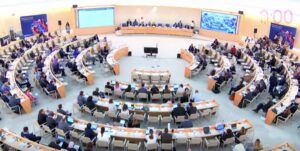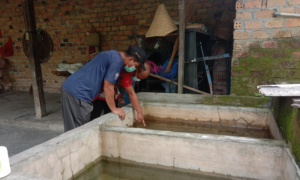What we learned from COVID-19
The global impact of the COVID-19 pandemic has been devastating, causing immeasurable losses affecting countless lives, economies, and communities. Despite progress in battling the virus, the human toll keeps rising, with an estimated 7 million lives lost worldwide. Some experts suggest the real toll could be closer to 15 million as of 2022.
However, this tragedy has taught us valuable lessons that should guide our response to future public health crises. The COVID-19 pandemic has shown the necessity of an organization with the power and authority to coordinate the response to global health emergencies and hold countries accountable for their commitments to international law.
The absence of central coordination, solidarity, effective governance, and a legal framework for compliance allowed states and agencies to act in their own interests, failing to meet international commitments and disregarding international health laws during the pandemic. The lack of a supranational governing body has led to individualistic country responses, ignoring consequences beyond their borders.
The catastrophic effects of the COVID-19 pandemic extend far and wide. From a financial perspective, the pandemic is expected to cost the United States a staggering $14 trillion. However, the true damage goes beyond monetary figures, impacting lives and livelihoods immeasurably. Additionally, the enduring impact is evident in the rise of mental health disorders, including anxiety, depression, and substance abuse, affecting various parts of society.
Though the full extent of the pandemic’s damage is not yet clear, there’s an urgent need to act as scientists warn of a heightened risk of a new pandemic.
Is the world prepared for the next pandemic?
The answer is a clear “no,” but there’s a way forward. The COVID-19 crisis showed the dire results of an uncoordinated response. Collaboration is key.
An article in The Lancet, a top scientific journal, proposes a global public health convention to revamp the pandemic prevention and response framework. It lays out recommendations to create a governance structure, assess compliance, rectify shortcomings, and monitor progress. Currently, WHO member states are negotiating this convention.
The article suggests best practices and improvements to the current system without specifying exact components or actions. It highlights the need to deepen some practices, like having a single authoritative information source.
It also points out flaws in the International Health Regulations (IHR), an international treaty. These gaps should be filled with incentives for cooperation or sanctions for non-compliance.
Additionally, a governance structure with authority to coordinate prevention, preparedness, and response globally is vital. It needs the means to assess compliance, rectify issues, and monitor progress. Some experts propose a high-level council outside the WHO to manage pandemic efforts and compliance.
Creating this global public health convention requires collaboration and commitment. However, when compared to the enormous costs of the COVID-19 pandemic on society and the economy, it becomes a feasible plan to combat future pandemics.
As COVID-19 transitions from a Global Health Emergency, it’s crucial to understand that without a comprehensive plan for future pandemics, we can’t expect better outcomes.
References,
- WHO Coronavirus (COVID-19) Dashboard. https://covid19.who.int/
- UN report finds COVID-19 is reversing decades of progress on poverty, healthcare and education. https://www.un.org/es/desa/un-report-finds-covid-19-reversing-decades-progress-poverty-healthcare-and
- Inoculating Against Fake News About COVID-19. https://www.frontiersin.org/articles/10.3389/fpsyg.2020.566790/full
- Equitable access to COVID-19 vaccines makes a life-saving difference to all countries https://www.nature.com/articles/s41562-022-01289-8
- A global public health convention for the 21st century https://www.thelancet.com/journals/lanpub/article/PIIS2468-2667(21)00070-0/fulltext
- The importance of accountability in tackling future pandemics https://www.thelancet.com/journals/lancet/article/PIIS0140-6736(23)00638-4/fulltext
- COVID-19’s total cost to the economy in US will reach $14 trillion by end of 2023 – new research. https://theconversation.com/covid-19s-total-cost-to-the-economy-in-us-will-reach-14-trillion-by-end-of-2023-new-research-205379








